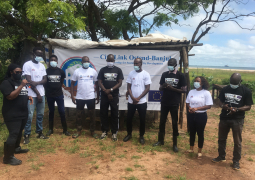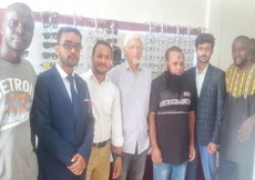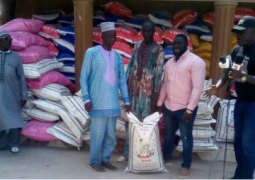
The Soil Solution, a registered non-governmental organization(NGO) in The Gambia since 2018 and officially launched in 2019 aims to protect and make available suitable soils that physically and structurally support plants with adequate nutrients and water supply.
The six months soil research project targets four farmers at Foni and Bafuloto in the West Coast Region of The Gambia. It was started in May 2023 and expected to be completed latest October 2023.
According to officials, the project aims to increase soil fertility and improve groundnut production in The Gambia as well as boost socio-economic growth. It is also meant to enable Gambian agriculturists use local resources to improve the soil fertility instead of using foreign chemicals.
Oyster Shell, a byproduct of shell fish-farming contains a high amount of CaCO(3) and has a high potential to be used as a liming material in agriculture. However, the agricultural utilisation of oyster shells is limited due to its high concentration of NaCl. Oyster industrial waste can improve soil nutrient and enhance groundnut production.
Speaking to The Point exclusively, Ebrima Jarra, executive director of The Soil Solution-The Gambia said the project is of paramount importance to ensuring that the country’s biodiversity is preserved.
“The project also improves the income level of farmers and oyster producers,” he added.
The soil activist advised Gambian farmers to take responsibility for improving their soil nutrients, noting the soils are now exhausted because they have been used for farming for several decades without any form of management to retain fertility.
“It is the responsibility of the farmers to listen to technical people and ensure they manage the soil well for now and future productivity,” he said.
Jarra further urged The Gambia Government through the Ministry of Agriculture to give soil management and protection a priority, saying several agricultural projects have been implemented in the country without or little soil intervention.
“This is not right because soil is the starting point. Soil is where food begins. Therefore, if there is an agricultural project in the country it should have a soil intervention because food begins from soil,” he said.
He further called on the government to establish a soil laboratory so that farmers analyse their soil in the country instead of taking soil samples abroad for analysis.
“Analyzing soil samples abroad is expensive; it includes transport cost, accommodation and service payment,” he explained.
Concerning his partners, he said the support of Soil Management Service and the Community-Based Agriculture Solutions, US has been recognised and appreciated. He called for more support to ensure the crusade to regain soil fertility is attained.




